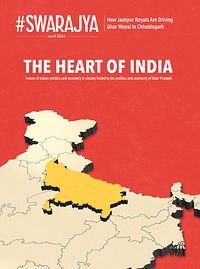World
UK And US- United And Divided By Migrants Issue
Swarajya Staff
Jun 25, 2016, 03:52 PM | Updated 12:57 PM IST
Save & read from anywhere!
Bookmark stories for easy access on any device or the Swarajya app.

Two democracies across the Atlantic are grappling with one core issue – migrants. While the solution to the issue in the United Kingdom came in a direct democratic way, the Supreme Court in the United States did not offer a clear answer. Instead, it put a brake to President Barack Obama’s plans on illegal migrants.
On Friday, the results of Thursday’s referendum came and the voters have voted in favour of Brexit: British exit from the European Union. Britain’s exit will affect the British economy, its immigration policy and lots more.
Polling data shows high levels of hostility to immigrants, going back decades before mass immigration began. But the huge increase in immigration, in the past 20 years, has made this sentiment politically relevant.
Over the course of the past 20 years, the percentage of Britons ranking ‘immigration/race relations’ as among the country’s most important issues has gone from a near zero percent to about 45 percent. 77 percent of Britons today believe that immigration levels should be reduced. Interestingly, India and Pakistan are the first and third largest sources of British immigration.
The US Supreme Court on Thursday blocked Obama’s plan to spare millions of immigrants in the country illegally from deportation in a split ruling that heartened political foes who had accused him of overstepping his powers. The 4-4 ruling comes seven months before Obama’s term in office ends.
The Supreme Court had heard arguments in April over whether to revive Obama’s plan to spare roughly four million undocumented immigrants – those who have lived illegally in the US at least since 2010, have no criminal record and have children who are US citizens or lawful permanent residents.
The president took the unilateral action after House Republicans thwarted bipartisan legislation, providing a path to citizenship for illegal immigrants that was passed by the Senate in 2013.
But his executive action was challenged by 26 states, all of which are led by Republican governors. They argued that Obama had overreached and does not have the power to effectively change immigration law.
A federal judge in Texas ruled in their favour and the fifth US circuit court of appeals upheld that decision last November. The case has political purchase in an election year in which the presumptive Republican nominee, Donald Trump, has pledged to round up and deport all 11 million undocumented immigrants.
How has immigration divided Britain?
When immigration to the UK really took off, between 2004 and 2014, the percentage of migrants entering the UK from Europe spiked. It went from a little over 25 percent to a little under 50 percent, which means that Europe has driven a lot of the recent rise in the UK’s immigrant population.
The EU starting expanding in 2004 to include most post-Communist countries in central and eastern Europe. These countries are poorer, which means that when they acceded to the EU, their citizens were more likely to move out of them to find work in richer countries such as the UK. Indeed, Poland is now the second largest source of immigrants to the UK, just behind India.
As a result, anti-immigrant demagoguery has become politically potent. The UK Independence Party (UKIP), led by a Donald Trump-style populist demagogue named Nigel Farage, began life as an irrelevant anti-EU party in the early ‘90s. But in the past 10 years, UKIP’s poll numbers have soared. It got four million votes in the 2015 election, the third largest national vote total in the country.
The US case hinges on the legality of the Deferred Action for Childhood Arrivals (DACA) and the Deferred Action for Parents of Americans (DAPA) initiatives. They had been on hold since 2015 as the court considered the programmes’ legality.
DAPA was considered particularly controversial as it allows the parents of US citizens and permanent residents to remain in the county for up to three years and to apply for work permits.
Lawyers for the state of Texas argued that state governments would be overburdened by having to spend more on public services, with the addition of the undocumented residents.
The lack of ruling leaves the legal status of about four million undocumented immigrants in limbo.
President Obama’s unilateral action would have allowed migrants to obtain work permits and would block them from deportation, while their citizenship status was being determined by lawmakers.
Xenophobia is on the rise, as expressed on a mass scale by the British and at the political level in the United States, like the Republicans and their soon to be declared presidential candidate, Donald Trump.
Save & read from anywhere!
Bookmark stories for easy access on any device or the Swarajya app.
Introducing ElectionsHQ + 50 Ground Reports Project
The 2024 elections might seem easy to guess, but there are some important questions that shouldn't be missed.
Do freebies still sway voters? Do people prioritise infrastructure when voting? How will Punjab vote?
The answers to these questions provide great insights into where we, as a country, are headed in the years to come.
Swarajya is starting a project with an aim to do 50 solid ground stories and a smart commentary service on WhatsApp, a one-of-a-kind. We'd love your support during this election season.
Click below to contribute.





